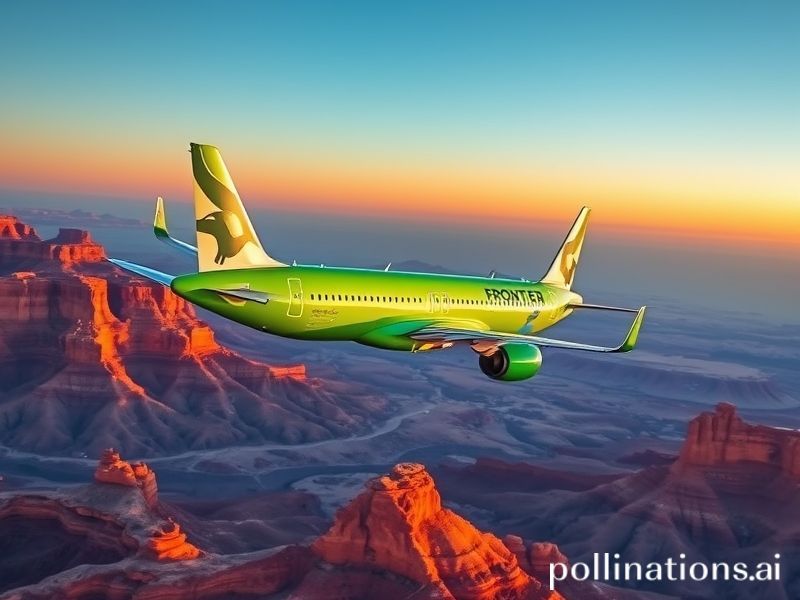Frontier Airlines: How America’s Cheapest Flight Became the World’s Most Expensive Lesson in Human Geometry
Frontier Airlines: The Spirit of the American West, Now Available in a Middle Seat Near You
By: Our Man in the Departure Lounge
DENVER—Somewhere over the North Atlantic, a Lufthansa A350 glides toward Frankfurt like a well-funded social-democracy, sipping fuel and serving Riesling. Ten thousand feet below, an Airbus A320 with a raccoon on the tail—Frontier Airlines’ beloved spokes-vermin—shudders eastward to Trenton, New Jersey, because apparently that’s where dreams go to stretch their legs for $39.99 plus tax.
To the rest of the planet, Frontier is the latest American export that nobody asked for but everyone will eventually sample, like pumpkin-spice hummus or democracy seminars. The airline’s business model—pack passengers tighter than UN sanctions and charge for oxygen—has become a transatlantic conversation piece. At dinner parties in Berlin, the mere mention of a $17 “perk bundle” that still excludes the tray table elicits the same sympathetic cluck usually reserved for U.S. healthcare.
Yet Frontier’s ascendancy is not merely a domestic curiosity; it is a geopolitical parable. While Europe tinkers with Green Deal aviation taxes and Asia races toward hydrogen prototypes, the United States has doubled down on the belief that the working class deserves to fly, just not comfortably. Call it the Manifest Density seating plan: 28 inches of legroom, 200 souls, one shared armrest the size of a communion wafer.
From São Paulo to Seoul, legacy carriers watch Frontier the way aristocrats once watched guillotine construction: with dread, fascination, and the creeping suspicion that their own necks might be next. LATAM executives whisper about “ultra-low-cost contagion.” Air France middle-managers Google “how to monetize lavatory queues.” The International Air Transport Association, whose acronym doubles as the sound your back makes after six hours in 29E, convenes emergency panels titled “Revenue Integrity in the Age of À-la-carte Humanity.”
The global implications? First, a slow erosion of the post-war social contract that treated aviation as a quasi-public utility. Second, a planetary race to the bottom measured not in carbon emissions but in cubic centimeters of personal space. Third, a cultural shift: once, crossing an ocean was an event; now it’s a meme. Somewhere, a backpacker uploads a TikTok titled “Survived Frontier—London to Orlando, $99, No Food, Two Fistfights,” soundtracked by a slowed-down remix of “God Save the Queen.” It has 4.7 million likes.
Economists call this “democratization.” Frequent flyers call it “Tuesday.”
Of course, Frontier insists it is doing God’s work: connecting cousins in Cleveland to cousins in Cancún, enabling grandmothers to meet newborns before the infants outgrow the free diaper allowance. Critics counter that the airline merely monetizes human misery with algorithmic precision, like Amazon recommending coffins to people who searched for melatonin. Both statements can be true; this is America, land of the complimentary contradiction.
Internationally, Frontier’s playbook has already been photocopied. Hungary’s Wizz Air paints its planes pink and charges for cabin bags the size of a paperback. India’s Akasa Air promises “fresh interiors,” code for seats that still have that new-plane smell—soon to be eau de samosa. Even staid old British Airways is testing “basic economy” so stripped down that passengers are advised to bring their own hope.
The upshot? A future where airfare is cheaper than the Uber to the airport, yet the true cost is measured in vertebrae and dignity. Climate diplomats may fret about emissions per capita, but the real metric is suffering per seat-mile, and on that score, Frontier is the undisputed world leader.
As the sun sets over another Denver tarmac, raccoon-eyed crews flip a plane in 25 minutes flat—quicker than a Moscow election. Somewhere in economy, an Italian exchange student discovers that the “water service” is a credit-card swiper above the sink. He shrugs, pays, and mutters, “When in America.”
He’s wrong. It’s no longer just America. It’s the new global frontier.







